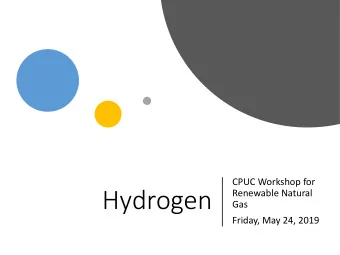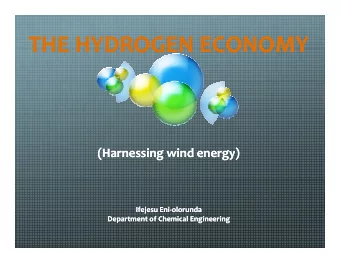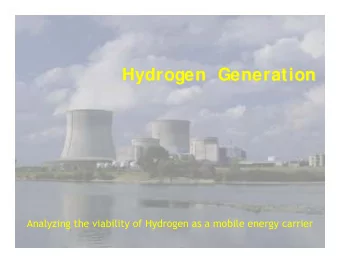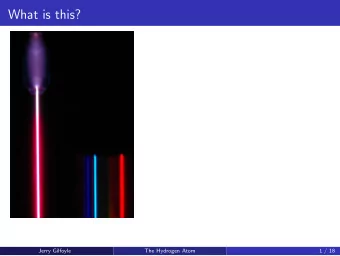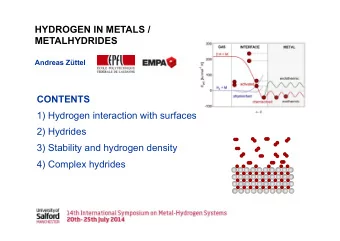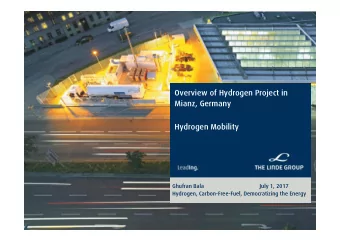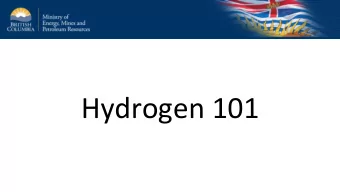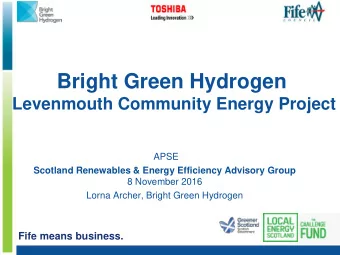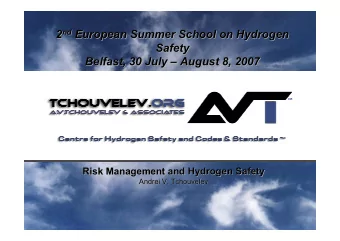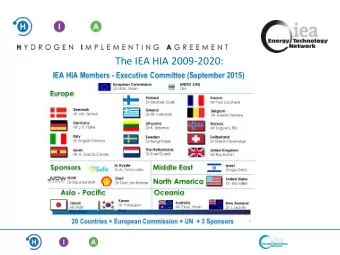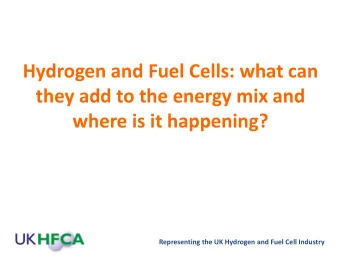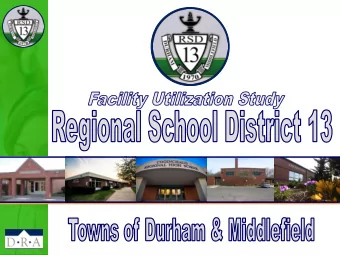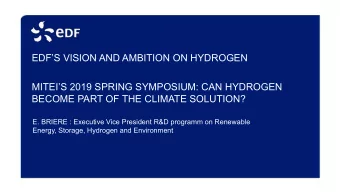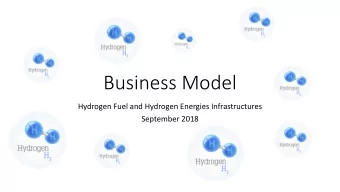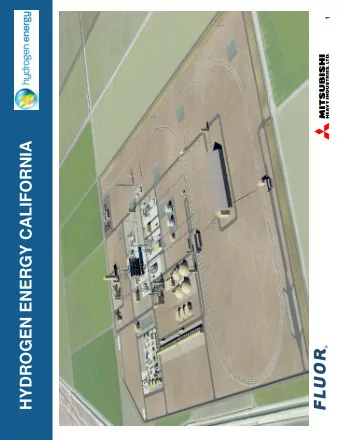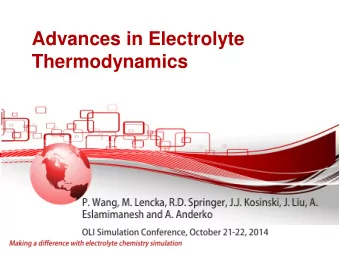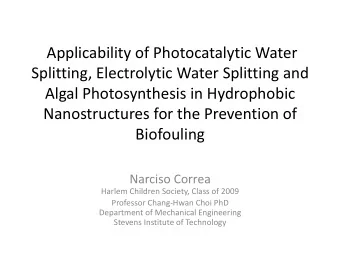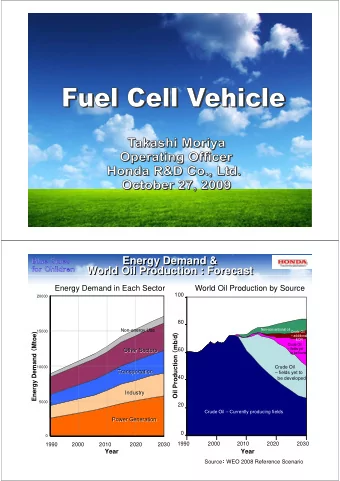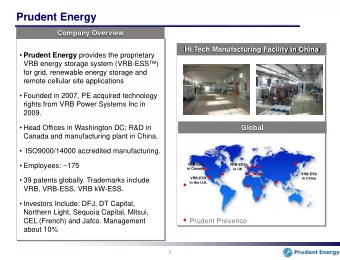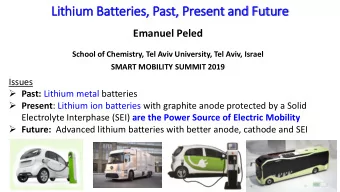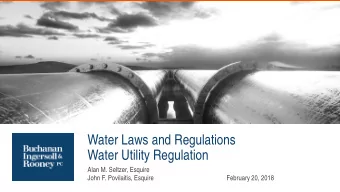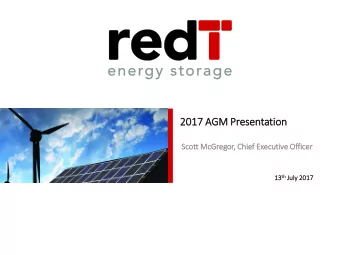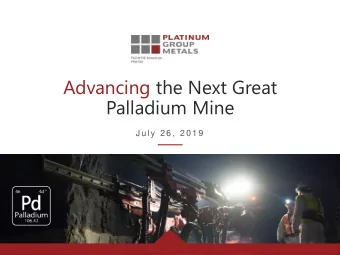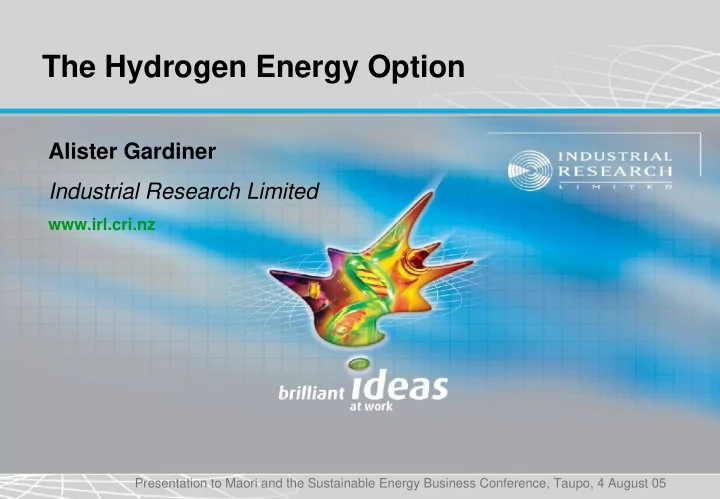
The Hydrogen Energy Option Alister Gardiner Industrial Research - PowerPoint PPT Presentation
The Hydrogen Energy Option Alister Gardiner Industrial Research Limited www.irl.cri.nz Presentation to Maori and the Sustainable Energy Business Conference, Taupo, 4 August 05 Presentation Overview Energy situation analysis Why
The Hydrogen Energy Option Alister Gardiner Industrial Research Limited www.irl.cri.nz Presentation to Maori and the Sustainable Energy Business Conference, Taupo, 4 August 05
Presentation Overview � Energy situation analysis � Why hydrogen? � Hydrogen and fuel cell basics � Global scene � What’s happening here? � Summary 2
Energy Drivers for Change #1 #3 Global Global Energy Supply Issues Affordable Warming & Energy � Issue #1 – Climate Change Pollution Continued fossil fuel use will accelerate climate change � Issue #2 – Constrained Resources Energy supply security, delivery R&D Increasing infrastructure, competition for Energy resources Production #2 � Issue #3 – Affordable Energy Constrained Cost impacts on wellbeing and Resources economic competitiveness Increasing Demand 2 - 4%/yr 3
Situation Analysis - Summary Some Market Predictions � The International Energy Agency predicts that electricity’s share of the market in OECD countries will grow from 24% in 1970 to 40% in 2020 � Dupont – small stationary fuel cell market will be valued at $8 billion USD by 2010 � Fuel revenues from fuel cell use in Europe may reach 17 billion Euro by 2040 � Price Waterhouse Coopers - by 2020 hydrogen technologies and related goods and services will exceed 1.7 trillion USD in worldwide sales � ABIresearch – distributed generation investment $NZ26 billion/yr worldwide � by 2015 30% of Germany’s generation will be distributed 4
Situation Analysis - New Zealand � Fossil Resources, at current extraction rate: Fuel Recoverable � Gas: declining, <10yrs Reserves (PJ) Gas 2,273 � Oil: very limited, < 2 yrs Oil 591 � Coal: large, >1000yrs Coal 103,324 � Renewable Resource opportunities � Solar: very good, 1000 -1400 hrs/yr � Biomass: excellent growth rates, pinus radiata 20yr cycle � Wind: excellent, many sites > 45% capacity factor � Wave: excellent, (near shore 20kW/m, deep water 100kW/m) � Some additional geothermal possible 5
Situation Analysis - New Zealand � Future Energy Supplies � Future Energy Carriers � Direct use of renewable resources � Electricity where possible � Fuels � Clean up fossil resources before � Natural gas and LPG use � Methanol? � Process and manufacture more � Ethanol? convenient energy carriers where � Biodiesel? appropriate � Hydrogen? 6
Why Hydrogen? � Fact #1: Fuel Cells need hydrogen � Efficient - up to 83% electrical energy + heat + water � NO exhaust pollution � NO noise or vibration � Fact # 2: Hydrogen must be manufactured � it is only an energy carrier � Fact #3: Ultimately hydrogen must come from sustainable resources A fuel Cell Stack � From solar or biomass sources � From nuclear energy? 7
Why Hydrogen? � Potential role in the future energy infrastructure � As a transport fuel for fuel cell vehicles (FCVs) � For stationary generation using fuel cells A residential fuel cell A fuel cell vehicle 8
Why Hydrogen? – Transport Creating a new sustainable Transport Infrastructure through Fuel Cells and Hydrogen Passenger vehicle “well to wheels” performance comparison for 10 different ICE and FC drive systems (Source: Scientific American, May 2004) � Hydrogen FCV has best efficiency (22%), and lowest emissions of the fossil options (140gm/km) � Ethanol FCV has lowest GHG footprint (10gm/km) due to renewable fuel source, but modest efficiency (10%) � Next best are: � Efficiency - petrol electric and diesel electric hybrid (18%) � Emissions – methanol and petrol FCV (210/220gm/km) � According to this study – FCVs provide real benefits through improved fuel efficiency and reduced GHG emissions In a FCV, the electrical output drives an electric motor directly or feeds an energy storage buffer consisting of batteries or supercapacitors (hybrid FCV) 9
Why Hydrogen? – Power Supply Creating a new sustainable Distributed Energy Power Supply Infrastructure through Fuel Cells and Hydrogen � Distributed Generation (DG) can: � Reduce losses � Reduce environmental impact � But solar and wind resources are unpredictable � Fuel Cells have a role through: � Providing firm capacity � High electrical efficiency � Zero/Low emissions � Quiet operation � CHP 10
Why Hydrogen?- Sources Potential Role of Hydrogen in the Future Energy Infrastructure Resources Carriers Distribution Utilisation Market Entry Electricity Hydrogen Fuel cell markets o o Nuclear Portable power o o Coal Power 2004-2006 o o Oil heat Stationary o o NG/LPG Power power Biomass o o (Distributed CHP Energy) Solar o o 2006-2012 o Wind Transport o Geothermal Power power (Road o Marine Vehicles) losses 2015-2030 11
Fuel Cell Basics � What is a Hydrogen Fuel Cell ? An electrochemical generator that combines hydrogen and oxygen to produce dc electricity, heat, and water. Hydrogen + oxygen = water + electricity + heat 2H 2 + O 2 = H 2 O + free energy (electrical power + heat) There are about half a dozen promising hydrogen fuel cell technologies Gas diffusion electrodes Proton Exchange Membrane (PEMFC) is the dominant technology being developed for vehicles Electrical Load 12
13 Membrane electrode assemblies (MEAs or � Fuel Cell Components Fuel Cell Basics gas diffusion electrodes)
Integration of community distributed energy solutions (IDES) Fuel Cell Basics � Fuel Cell generator system consists of � Stack � Fuel processing � Monitoring and control � Power electronics interface � IRL Fuel Cell system development � 1.2kW DCI 1200 field ready generator for pilot demonstration systems Fuel Cell generator being � Hydrogen gas fuel or methanol/ethanol with developed for residential power supply by Industrial Research fuel processor Limited � Combined power and hot water � Comply with safety regulations 14
Hydrogen Basics 0n Earth, hydrogen is bound up CH 4 CO 2 INCREASING O 2 in a biological energy cycle, 1 ENERGY ENERGY CONTENT and we can extract it from OUT various points after other LIVING O 2 ANIMALS organisms have increased O 2 FOOD DEATH CO 2 CO 2 the energy value: CH 4 1. Hydrocarbons processed LIVING from animals (fats, oils, DECAY & DEATH DEATH PLANTS UTILISATION methane, etc.) ENERGY ENERGY IN 2. Hydrocarbons processed OUT solar wasted as from biomass (cellulose, radiation heat or WATER sugars, starches, methane, captured in coal, etc.) various 3 2 ways 3. Water is an inexhaustible source of hydrogen, but THE (EARTH-BOUND) HYDROGEN ENERGY CYCLE extracting it always requires more energy than we get At present, natural gas, a fossil fuel, is the cheapest way to back produce hydrogen 15
Hydrogen Basics Sources of Hydrogen Hydrogen Production Processes � Fossil Resources � Chemical Processes � Natural gas � Pyrolysis � Petroleum oil � Gasification � Coal � Reformation � Water gas shift � Renewable Resources � Electrolysis � Biomass � Wind electricity � Direct thermal dissociation � Direct solar electricity � Photochemical � Marine electricity � Biological Processes � Other � Geothermal electricity � Direct biological � Nuclear electricity � Fermentation 16
Hydrogen Basics � Many technology gaps to be addressed: � Production - high purity hydrogen from renewable energy sources � Storage - safe, high density hydrogen storage for distributed energy and transportation � Utilisation - hydrogen appliances, eg FC electrode life and cost, low cost catalytic combustion, sensors � Many research challenges: � High temperature processes, gas separation membranes, catalysis, electrochemistry, thermodynamics, metal-organic synthesis, surface science, materials technology, electrical engineering, energy control systems, hydrogen diffusion and embrittlement, CO 2 sequestration 17
Global Scene � How Serious is the International Community? � Iceland � Govt commitment to a hydrogen economy � Energy companies � Several hundred fuel cells piloted in residential and commercial applications � Vehicle manufacturers � All major manufacturers are demonstrating close to market-ready vehicles � USA, Europe government research programs � $US350m to 130 institutions and companies for hydrogen fuelled cars � EU 350m Euros in 6 th framework to hydrogen and fuel cell research � Cities – public transport demonstrations � 13 Daimler Chrysler FC bus sites around the world � New Zealand? � a modest government funded research program � but as yet no attempt to develop a hydrogen pathway 18
Global Scene – Transport Fuel Cells Hydrogen Vehicle Trials � Hundreds of fuel cell vehicles are now in daily operation around the world � 50+ hydrogen gas filling stations in place in USA, Japan and Europe � Manufacturers and gas suppliers are carefully monitoring all aspects of vehicle and fueling station performance Daimler Chrysler fuel cell bus Fuel cell passenger vehicle Ballard fuel cell bus engine 19
Recommend
More recommend
Explore More Topics
Stay informed with curated content and fresh updates.
